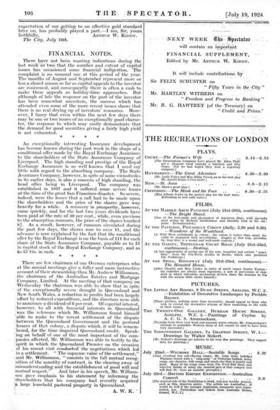FINANCE-PUBLIC & PRIVATE.
[BY OUR CITY EDITOR.]
RISE IN STERLING.,
[To the Editor of the SPECTATOR.] SIR,—The influences operating upon markets during the week have been of a mixed character. On the one hand high-class investment securities have benefited by a slight easing of the monetary situation and still more by the sharp recovery in sterling as expressed in American currency. On the other hand, the unexpected revolutionary movement in Brazil at the moment when public attention was centred upon the prospects of fiscal reforms in that country occasioned not only a severe fall in Brazilian securities, but a sympathetic decline in other semi-speculative descriptions. Nor, in considering this tendency for high-class invest- ment stocks to harden and the more speculative markets to weaken a little, must sight be lost of the imminence of the London Conference concerning European affairs. When conferences such as these are first announced, the effect is usually to stimulate optimism with regard to the outcome. As the time draws near, however, it is not surprising that optimism should give place to anxiety, and a keener appreciation of the many difficulties which have to be overcome. As, however, I have fre- quently explained, the issues of the Conference have a very direct bearing upon the course of the Stock Markets, the line of reasoning being that a settlement of reparations is likely, ultimately, to revive confidence and stimulate trade, and that a continuance of the dead- lock, on the other hand, must prolong uncertainty and timidity and, consequently, the tendency to select gilt- edged securities rather than securities more directly affected by any improvement in trade.
In view of what has already appeared in the general columns of the Spectator concerning monetary policy, I think it is only right to record faithfully the views of the City with regard to the recent improvement in the American exchange on London. Throughout all this Bank Rate controversy there is a point which escapes the ordinary critic, though it is one with which banking and financial experts are familiar. I refer to the dis- tinction between a rise in the Bank Rate and steps to make the existing rate effective. For reasons which space prevents me from discussing, post-War conditions make it infinitely more difficult to make Bank -Rate nowadays thoroughly effective, and by " effective " I mean for ordinary rates in the open market to be brought up close to the Official Rate. At the moment of the appearance of Mr. Leaf's article suggesting a rise in the Bank Rate from 4 to 5 per cent., the Market Rate of discount was virtually under 8 per cent. Mr. Leaf drew attention to certain aspects in the international financial outlook which called for higher money rates, and the result, so far, has not been a rise in the Bank Rate to 5 per cent. but a rise in the Market Rate of discount to over 81 per cent. based on apprehensions of the possi- bility of a rise in the Official Rate. It is partly (not wholly, I admit) that rise in our Market Rate of discount, combined with the impression conveyed to America that Britain was intending to get back to an effective gold standard, which has moved the American exchange in our favour. At the moment of writing there is a reaction in the New York rate on London to 4.361 after touching 4.381, but even the present quotation, it is worth noting, compares favourably with about 4'31 touched dur- ing June when our discount rate was under 8 per cent.
We have experienced, in fact, the very reverse of what took place in the autumn of last year, when, simply as a consequence of a few indiscreet remarks from the Minister of Agriculture indicating the possibility of a policy of inflation being persued here, there was an instant fall in the American and other exchanges on London. It required weeks of denials of the story to obliterate its effect upon the exchanges, and so to-day, while I think a part of the rise in sterling must be attributed to some special and temporary Continental selling of dollars. the hardening of money rates here, plus the expectatioq of our getting to an effective gold standard later on, has probably played a part.I am, Sir, yours







































 Previous page
Previous page